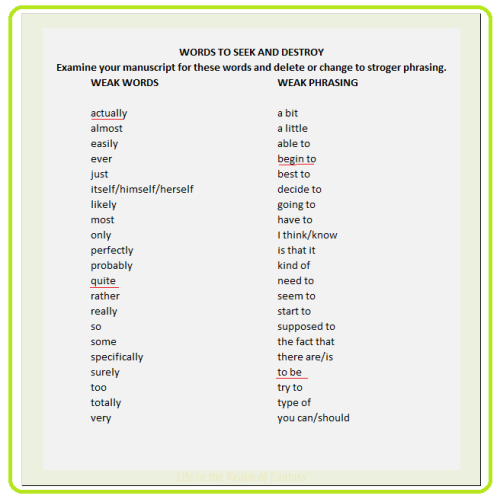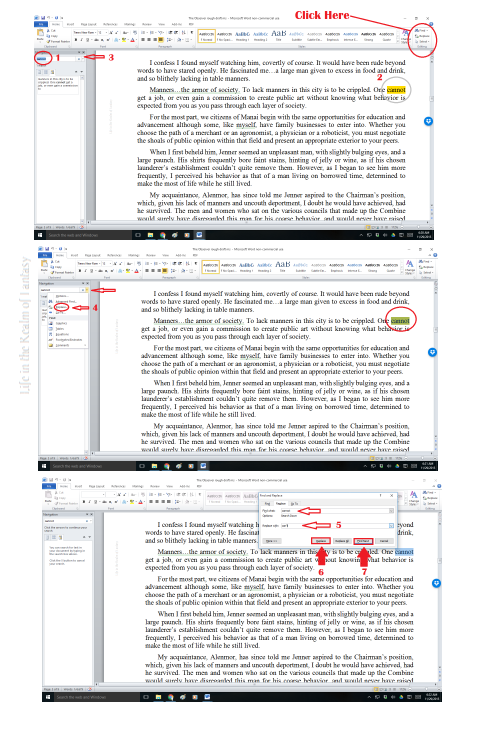It’s been about a year since I last discussed what have been termed “weed words.” Certain words and phrases don’t add to the narrative and only serve to increase the wordiness. Used too freely, they separate the reader from the experience.
In my first draft, these words are like tics–they fall out of my fingers and into my keyboard randomly, and out of my voluntary control. I never self-edit as I write the first draft because I am just trying to get the story down. The second and third drafts are where you deal with grammar and phrasing.
One of my three current manuscripts is an epic fantasy and is genre fiction. This means I must write active prose, so I don’t want to use words with no power behind them.
And these are just the tip of the verbal iceberg. I seek out adverbs, descriptors, qualifiers, and other “weed words,” look at how they are placed in the context of the sentence, and decide if they will stay or go.
In the second draft I address larger things like the story arc, and plotting problems. I have a reader who will gladly tell me where I have gone off the rails, and he is merciless. Call me a glutton for punishment, but putting Dave’s suggestions into play is the best part of my writing experience, even though it is hard to give up some of my favorite passages.
If they don’t add to the story, they have to go to the outtakes file, my tears notwithstanding.
The third draft is the most difficult, primarily because I just want to be done with it. This is where I go on a “search and destroy” mission, seeking out instances of weak words and timid phrasing words. Consider adverbs: I do a global search for the letters “ly.” I kid you not, a kajillion of them will pop up in my left margin, and my ms will become a mass of words with yellow highlighted “ly’s.” It’s a daunting task, but I look at each and see how they fit into that context. If they weaken the narrative, I change or remove them. When it comes to adverbs, most often simply removing them strengthens the prose.
At this stage, I am preparing this manuscript to be edited professionally. The character arcs are solid, major plot problems have been addressed, and the story is as good as I can make it. Before I bother an editor with it, I want to make the process as smooth as possible. In order to find the offending words, I do what is called a “global search.”
With your mouse or stylus, highlight the word you want to find every occurrence of. On the far right of the home tab, click ‘find.’ This will open the navigation pane.
Or, on your keyboard press the ‘ctrl’ key and the ‘f’ key at the same time. This is the keyboard shortcut to the navigation pane. Follow the instructions in this image:
Caution: if you are hasty or impatient a global search can be dangerous and can mess up an otherwise good manuscript.
Be aware: This is a boring, time-consuming task.
 You can’t take shortcuts. If you get hasty and choose to “Replace All” you run the risk of creating inadvertent bizarreness in your work.
You can’t take shortcuts. If you get hasty and choose to “Replace All” you run the risk of creating inadvertent bizarreness in your work.
Suppose you decide to simply eliminate every instance of the word “very” because you have discovered you overuse it. You open the navigation pane and the advanced search dialog box. In the ‘Replace With’ box you don’t key anything, thinking this will eliminate the problem.
Before you click ‘replace all’ consider three common words that have the letters v-e-r-y in their makeup:
- Every
- Everyone
- Everything
Deleting every instance of ‘very’ could mess things up on an incredibly large scale.
Examine the context. Have you used the word “actually” in a conversation? If so, you may want to keep it, as dialogue must sound natural, and people use that word in conversation. If you have used it to describe an object, consider ditching it.
Do take the time to look at each example of the offending words and change them individually. The way I see it, what’s a day or two spent doing the job right, as compared to the year or more you’ve already spent writing that novel?
As always, while I am going through this, I address the occasional awkward phrasings and other things that pop up when you look at your manuscript from a different view.
It’s unfortunate, but there is no quick way to do this. Every aspect of getting your book ready for the reading public must be done with the human eye, patience, and attention to detail.
As I have mentioned before, editing programs are out there, some free, and some for an annual fee. Grammarly is one, but the problem is, these programs are unable to see the context. They operate by finite rules and will often strongly suggest you insert an unneeded article, or change a word to one that is clearly not the right one for that situation:
- “The tea was cool and sweet, quenching her thirst.“
- Grammarly suggested replacing quenching with quenched. I have no idea why.
Context is defined as the parts of a written or spoken statement that precede or follow a specific word or passage, usually influencing its meaning or effect.
At this time in our technology, understanding context is still a human function. Because context is so important, I am wary of relying on these editing programs for anything other than alerting you to possible comma and spelling malfunctions.
I don’t mind taking the time to visit each problem and resolve them one at a time. Remember, readers don’t forget the authors whose work they despised.










You seem to take undue delight in slaughtering your darlings.
LikeLiked by 2 people
I do 😀
LikeLike
Merciless? I’m surprised you didn’t write horribly merciless. Haha.
I agree with your comment about Grammarly, but I do find it useful as part of a final review.
LikeLiked by 1 person
Incredibly merciless! And, I agree about the Grammarly – but you have to know the basic rules of grammar and how each instance of a word or punctuation fits in a given sentence to get the best results from it.
LikeLike
Sharing this with my writing group!
LikeLiked by 1 person
Another excellent post. Thank you. Just one issue tough that needs to be raised. Exactly those “weed” words, in fiction, can be useful to capture the “voice” of a character, because they tend to sound conversational. When narrating more objectively, “weed” words should be avoided. When narrating more subjectively, they can reflect some of what is going on inside the character and can help the reader feel closer to the character.
LikeLiked by 1 person
@Scott – You have raised an excellent point! Context is critical, because every word has a purpose.
I should caution my readers that “weed words” (not my invention, btw) are called that, because it’s easy to overuse them. Weeds are just plants that grow where we don’t want them!
LikeLike
Reblogged this on .
LikeLiked by 1 person
Hi
This is a amazing post, and a good help guide.
Streamlining a story helps with the clutter, and this posts can help get that accomplished.
From
Ru
LikeLike
@Ru – absolutely. This is what I am currently doing in the final draft of a novel, hence my whining, lol!
LikeLiked by 1 person
Pingback: Context and adverbs #amwriting | Life in the Realm of Fantasy